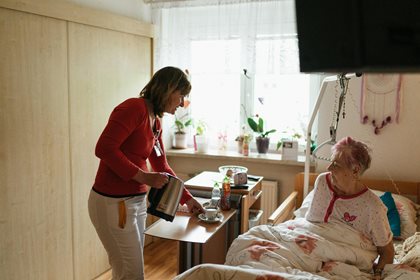Archive
-
2025
-
2024
-
2023
-
2022
-
2021
-
2020
-
2019
-
2018
-
2016
-
2013
Category
Évaluer l’impact de la COVID-19 sur les personnes âgées et le vieillissement par des approches interdisciplinaires et collaboratives : Déclaration commune de l’ACG/CAG et de la RCV/CJA
The COVID-19 pandemic and subsequent state of public emergency have significantly affected older adults in Canada and worldwide. It is imperative that the gerontological response be efficient and effective. In this statement, the board members of the Canadian Association on Gerontology/L’Association canadienne de gérontologie (CAG/ACG) and the Canadian Journal on Aging/La revue canadienne du vieillissement (CJA/RCV) acknowledge the contributions of CAG/ACG members and CJA/RCV readers.
Enhancing nursing home care for seniors: impact of a living classroom on nursing assistant’s education
Nursing Assistants (NAs) are the largest workforce in nursing homes, but often lack adequate preparation for their role. The Living Classroom (LC) is an integrated learning approach, whereby a NA program is delivered in a nursing home (NH) in collaboration with a community college. This paper describes the implementation and evaluation of the LC. Mixed methods were used to gather data from 48 NA students, 5 faculty, and 42 NH staff over 30 weeks. Students, faculty, and nursing home staff described the LC as a positive learning experience.
InterRAI Acute Care Instrument for Seniors in Canadian Hospitals: Findings of an Inter-Rater Reliability Pilot Study
This descriptive study focused on evaluating the interRAI AC instrument, which was designed to facilitate a comprehensive nursing assessment for hospitalized seniors. Sample characteristics were described, and Cohen’s Kappa was calculated to derive the inter-rater reliability. Assessment times to complete the instrument were collected as well.
Interdisciplinary and Collaborative Approaches Needed to Determine Impact of COVID-19 on Older Adults and Aging: CAG/ACG and CJA/RCV Joint Statement
The COVID-19 pandemic and subsequent state of public emergency have significantly affected older adults in Canada and worldwide. It is imperative that the gerontological response be efficient and effective. In this statement, the board members of the Canadian Association on Gerontology/L’Association canadienne de gérontologie (CAG/ACG) and the Canadian Journal on Aging/La revue canadienne du vieillissement (CJA/RCV) acknowledge the contributions of CAG/ACG members and CJA/RCV readers.
Chronic disease management models in nursing homes: a scoping review
Nursing home (NH) residents experience a high burden of chronic disease. Chronic disease management (CDM) can be a challenge, as the context of care provision and the way care is provided impact care delivery. This scoping review aimed to identify types of chronic diseases studied in intervention studies in NHs, influential contextual factors addressed by interventions and future CDM research considerations.






